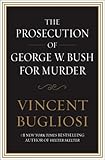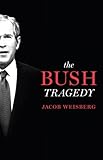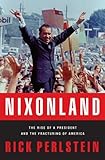I have, for some unknown reason, been reading a lot of “political” books lately. Nothing to do with the upcoming election, since I don’t like either major candidate and I’m already sick of the political ads and they haven’t even had the conventions yet.
There have been a lot of similar books published over the past decade or so, and I have neither the time nor the desire to read most of them. But several have caught my eye in recent months and I thought I’d pass along my comments, for better or for worse.
 I’ve already written about The Prosecution of George W. Bush for Murder, by Vincent Bugliosi, and you can see my comments on that book here. That book was a quick read. The next one, not so quick.
I’ve already written about The Prosecution of George W. Bush for Murder, by Vincent Bugliosi, and you can see my comments on that book here. That book was a quick read. The next one, not so quick.
The Bush Tragedy, by Jacob Weisberg, is an investigation into the Bush and Walker family history and their collective personalities, in an attempt to explain George W. Bush’s motivations. As with all books where the author is dealing with a living subject at second hand, and the subject of the book has made no personal contributions to it, one must read everything with the proper skepticism for armchair psychoanalysis.
 Still, it is apparent that Weisberg has done his best to be evenhanded and to both praise and criticize where each is appropriate. His analysis of why George W. Bush’s presidency is a tragedy that need not have been so is explained in careful terms, and his ongoing analogy with Shakespeare’s tragedy is apt. The book would be an eye-opener for anyone, regardless of his/her opinion of the subject.
Still, it is apparent that Weisberg has done his best to be evenhanded and to both praise and criticize where each is appropriate. His analysis of why George W. Bush’s presidency is a tragedy that need not have been so is explained in careful terms, and his ongoing analogy with Shakespeare’s tragedy is apt. The book would be an eye-opener for anyone, regardless of his/her opinion of the subject.
It would help, I think, to have read Kitty Kelley’s The Family: The Real Story of the Bush Dynasty before tackling The Bush Tragedy, because there is even more background information on the Bush, Walker and Pierce families that will show the reader where  Weisberg is coming from and round out the details. Say what you wish about Kitty Kelley, she’s an eminently readable writer and she notes quite correctly that no one has ever successfully sued her over the contents of her books. Given the kinds of high-priced lawyers some of her subjects could afford, and the resources at their disposal, that alone says something about the accuracy of Kelley’s reporting. And her notes about her sources for this particular book are eye-opening indeed.
Weisberg is coming from and round out the details. Say what you wish about Kitty Kelley, she’s an eminently readable writer and she notes quite correctly that no one has ever successfully sued her over the contents of her books. Given the kinds of high-priced lawyers some of her subjects could afford, and the resources at their disposal, that alone says something about the accuracy of Kelley’s reporting. And her notes about her sources for this particular book are eye-opening indeed.
The other book I’m reading right now is Nixonland: The Rise of a President and the Fracturing of America by Rick Perlstein. I haven’t finished it yet, but what I’ve read so far seems spot-on. I had already read Arrogance of Power: The Secret World of Richard Nixon by Anthony Summers, and learned quite a bit more about Tricky Dick than I had ever believed possible.
 I wouldn’t have been quite old enough to vote if the 18-year-olds-can-vote amendment had passed in 1968. My first presidential election was in 1972, in which I voted against Richard Nixon. Not for McGovern, who didn’t much appeal to me, but I’d seen enough of Nixon to want to vote for Donald Duck if it meant no more Tricky Dick in the White House. Perlstein’s book gives the historical perspective on the rise and fall and rise and fall of Richard Nixon, along with other “impossible” candidates like Barry Goldwater and Ronald Reagan. It’s a fascinating portrait of the times and, I think, a must-read for anyone who wants to understand why today’s political climate is the way it is.
I wouldn’t have been quite old enough to vote if the 18-year-olds-can-vote amendment had passed in 1968. My first presidential election was in 1972, in which I voted against Richard Nixon. Not for McGovern, who didn’t much appeal to me, but I’d seen enough of Nixon to want to vote for Donald Duck if it meant no more Tricky Dick in the White House. Perlstein’s book gives the historical perspective on the rise and fall and rise and fall of Richard Nixon, along with other “impossible” candidates like Barry Goldwater and Ronald Reagan. It’s a fascinating portrait of the times and, I think, a must-read for anyone who wants to understand why today’s political climate is the way it is.
That’s a lot of political reading for anyone, but for someone who is fascinated by history and biography (as I am), it’s well worth the time.
Have you read any of those books?
Hope you'll recommend my posts via your favorite social media. Just don't copy the material as your own.
